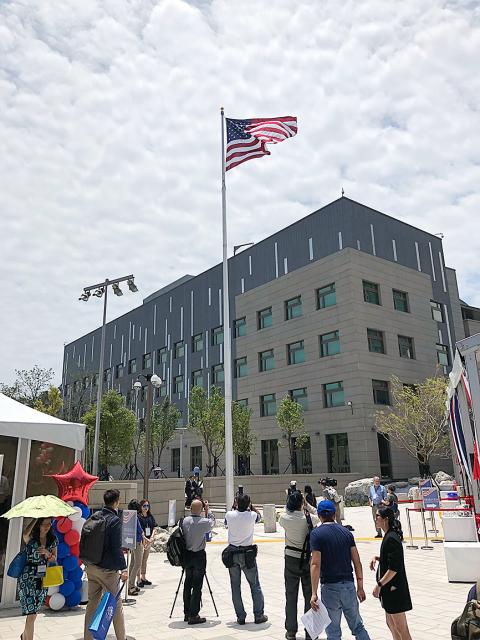The US is to station Marine security guards at the American Institute in Taiwan’s (AIT) new complex in Taipei’s Neihu District (內湖), which is to begin operations in September, sources familiar with the matter said.
The mission of Marine security guards is different from that of other US Marines, whose primary mission is combat, the sources said.
According to internal US mechanisms, before sending the guards overseas, the US assesses the safety conditions of the country and of the embassy facilities, and uses this information to determine how many guards to send, they said.

Photo: CNA
Rather than an increase in security standards, the stationing of the guards at the AIT could be considered a representation of how much the US values its relationship with Taiwan, they said.
In response to media speculation that US Marines would be stationed at the complex, Presidential Office spokesman Alex Huang (黃重諺) said that the AIT’s internal security arrangements are its own affair and that the Presidential Office has no comment.
Based on reciprocity, the military hopes to resume stationing military police at the Taipei Economic and Cultural Representative Office in the US and at its Twin Oaks residence in Washington to show that military cooperation and exchanges between Taiwan and the US have entered a new stage, an unnamed senior government official said yesterday.
Military police were still stationed at the office and at Twin Oaks following the severing of diplomatic ties between the Republic of China and the US in 1979, sources said.
However, due to efforts by the Ministry of National Defense to streamline its organization, the number of officers stationed at the locations was reduced to five, the sources said.
In 2004, the five military police officers were withdrawn and since then, Taiwan has hired local security personnel to guard the two locations, they said.
Earlier this year, former AIT director Stephen Young said that a “marine house” would be established inside the new complex in Taipei and that this was something he fought for during his tenure.
The marine house is often the center of diplomatic activities, and the new complex represents the US’ commitment to Taiwan, Young said at the time.
Asked in May about rumors that US Marines would be stationed at the complex, then-AIT director Kin Moy, who left office this month, said that the security plans for the complex remained unchanged.
Citing two US officials, CNN last month reported that the US Department of State had requested that US Marines be sent to Taiwan to guard the compound.
“One US official said that while the request for Marine security guards was received several weeks ago, it has not yet been formally approved and coordination about its deployment is ongoing between the state department’s Diplomatic Security Service and the Marines,” CNN reported at the time.
Additional reporting by Lo Tien-pin

Tropical Storm Gaemi strengthened into a typhoon at 2pm yesterday, and could make landfall in Yilan County tomorrow, the Central Weather Administration (CWA) said yesterday. The agency was scheduled to issue a sea warning at 11:30pm yesterday, and could issue a land warning later today. Gaemi was moving north-northwest at 4kph, carrying maximum sustained winds near its center of up to 118.8kph and gusts of 154.8kph. The circumference is forecast to reach eastern Taiwan tomorrow morning, with the center making landfall in Yilan County later that night before departing from the north coast, CWA weather forecaster Kuan Shin-ping (官欣平) said yesterday. Uncertainty remains and

SEA WARNING LIKELY: The storm, named Gaemi, could become a moderate typhoon on Wednesday or Thursday, with the Taipei City Government preparing for flooding A tropical depression east of the Philippines developed into a tropical storm named Gaemi at 2pm yesterday, and was moving toward eastern Taiwan, the Central Weather Administration (CWA) said. Gaemi could begin to affect Taiwan proper on Tuesday, lasting until Friday, and could develop into a moderate typhoon on Wednesday or Thursday, it said. A sea warning for Gaemi could be issued as early as Tuesday morning, it added. Gaemi, the third tropical storm in the Pacific Ocean this typhoon season, is projected to begin moving northwest today, and be closest to Taiwan on Wednesday or Thursday, the agency said. Today, there would likely

DISRUPTIONS: The high-speed rail is to operate as normal, while several airlines either canceled flights or announced early departures or late arrivals Schools and offices in 15 cities and counties are to be closed today due to Typhoon Gaemi, local governments announced last night. The 15 are: Taipei, New Taipei City, Taoyuan, Tainan, Keelung, Hsinchu and Kaohsiung, as well as Yilan, Hualien, Hsinchu, Miaoli, Chiayi, Pingtung, Penghu and Lienchiang counties. People should brace for torrential rainfall brought by the storm, with its center forecast to make landfall on the east coast between tonight and tomorrow morning, the Central Weather Administration (CWA) said. The agency issued a sea warning for the typhoon at 11:30pm on Monday, followed by a land warning at 11:30am yesterday. As of

CASUALTY: A 70-year-old woman was killed by a falling tree in Kaohsiung as the premier warned all government agencies to remain on high alert for the next 24 hours Schools and offices nationwide are to be closed for a second day today as Typhoon Gaemi crosses over the nation, bringing torrential rain and whipping winds. Gaemi was forecast to make landfall late last night. From Tuesday night, its outer band brought substantial rainfall and strong winds to the nation. As of 6:15pm last night, the typhoon’s center was 20km southeast of Hualien County, Central Weather Administration (CWA) data showed. It was moving at 19kph and had a radius of 250km. As of 3pm yesterday, one woman had died, while 58 people were injured, the Central Emergency Operation Center said. The 70-year-old